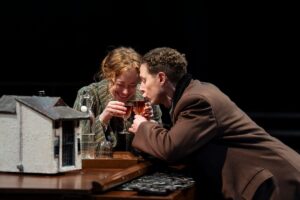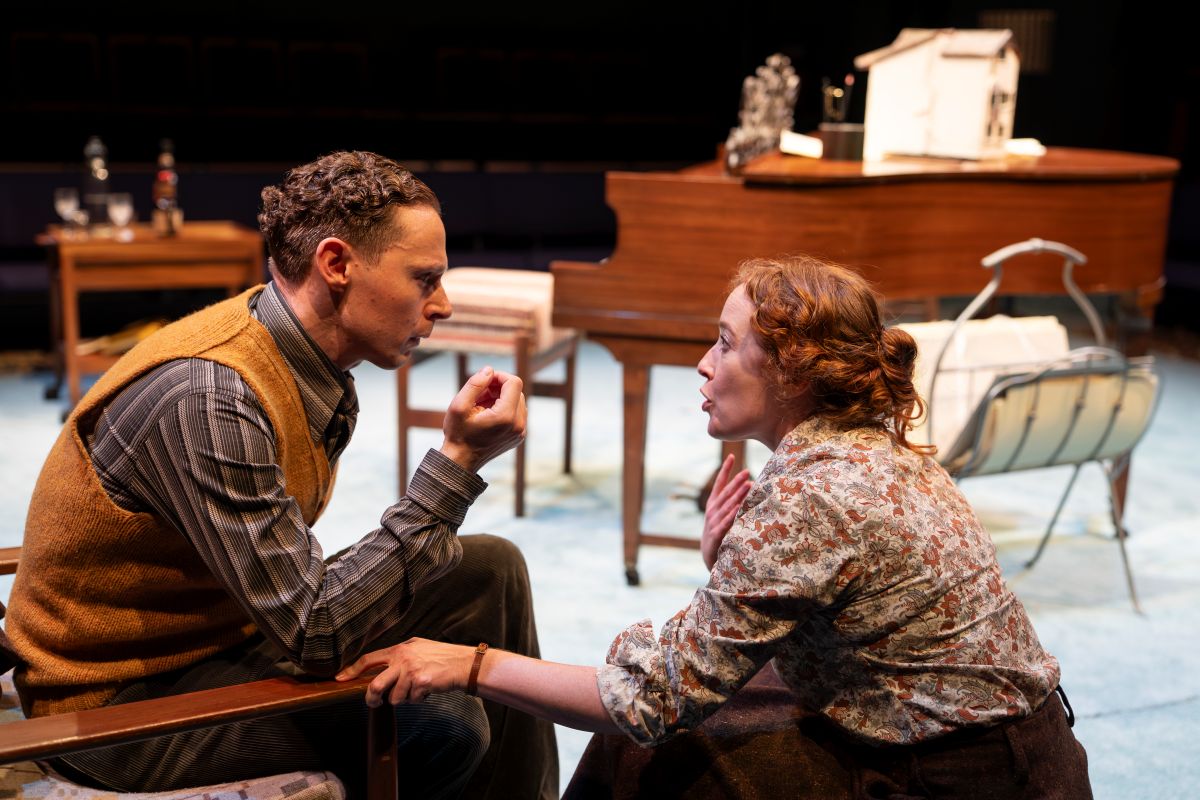When I first heard about this play I must admit that I thought it might only appeal to those (like me) who love the operas of Benjamin Britten. I am very glad to say that, whilst it does help to know a bit about his music, this is a marvellous little gem of a drama that will entrance anyone who cares about the making of great works of art, about the creative process, and about the stresses and strains that friendships can undergo in difficult times. The play is an intimate two-hander, perfectly suited to the small theatre-in-the-round of the Orange Tree, but there was not a moment in the two and a half hours when the momentum dropped. Ravenhill’s writing is the primary reason of course, but the two performances – by Samuel Barnett and Victoria Yeates – are quite superb.
In 1952 Britten was asked to write an opera for Covent Garden, to be performed as part of the celebration of the coronation of Elizabeth II. For a subject, he picked the story of Elizabeth I and the Earl of Essex, a somewhat unwise choice and one that was, in the outcome, very unpopular. Gloriana is a very fine opera but it has never recovered from the hostile reception it received in 1953. This play tells the story of the writing of the opera and of the role played by Imogen Holst in supporting Britten through the artistic travails of that process. Although Britten had invited Holst to Aldeburgh to assist him, it is clear that he was not sure if he really wanted her there and, if she stayed, what precise role she would take on. The play tracks the growing friendship between the temperamental composer and his no-nonsense “musical assistant” and ends with the opera’s first night and with Holst’s decision to put down roots in Aldeburgh.

The play is, of course, Ravenhill’s imagining of the way Britten and Holst worked together. We know a lot about Britten and a little about Holst but the closed world Ravenhill conjures up feels very true. Samuel Barnett conjures up a Britten who is lovable and infuriating by turns. Victoria Yeates makes Holst a figure of enormous charm and yet someone capable of standing up to Britten in his less reasonable moments. There is a bond of love and respect that grows between them and Bennett and Yeates invest this developing relationship with enormous emotional power. Both performances are quite superb and, just as happens in the best operatic duets, they listen and respond to each other with great sensitivity. By the end of the play I must admit that I was well beyond critical reserve and entirely invested in the outcome of their joint endeavour. It is two and a half hours of the finest acting I can remember seeing for a long time.
The four-sided stage doesn’t allow for much scenery – a baby grand piano on a revolve, a drinks trolley, a rack for music scores, a standard lamp. Given we have only two actors (I would have liked an appearance from Britten’s partner Peter Pears, often referred to, but never there in the flesh) director Erica Whyman tries to vary the pace and the visuals with moving the props between each scene but this all begins to seem fussy and superfluous as the drama develops and the relationship grips.
We cannot know the detail of the interactions of Britten and Holst during the time they worked together on Gloriana but the internal logic and the emotional power of the play is very convincing and the power of the performances is spell-binding. Ravenhill has produced something very special and he is lucky to have two such fine actors to bring it to life.
Orange Tree Theatre, Richmond
Author: Mark Ravenhill
Director: Erica Whyman
Performers : Samuel Barnett and Victoria Yeates
Running time: 2 hrs 30 minutes
Dates: until 17 May
Photo Credit: Ellie Kurttz

